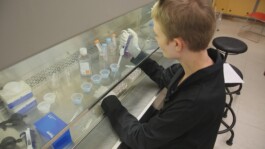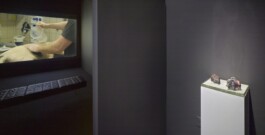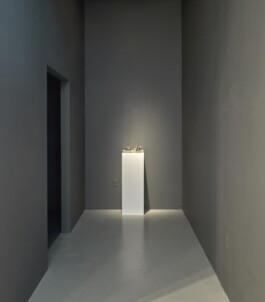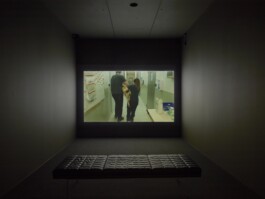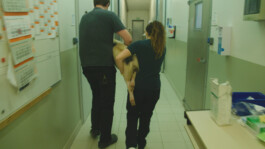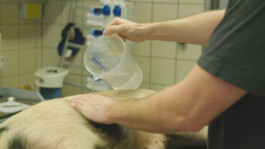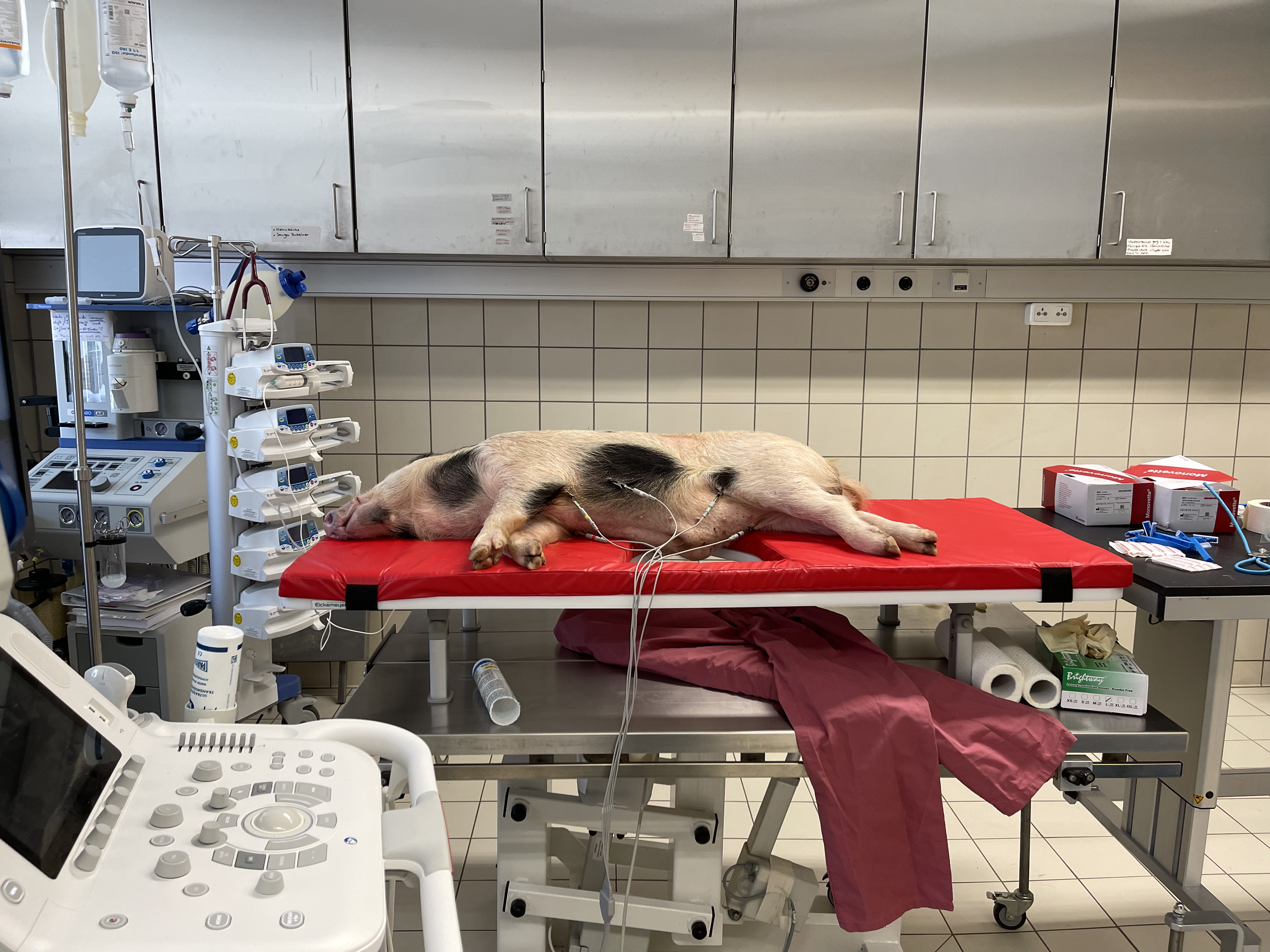Heather Dewey-Hagborg
BEMIS CENTER
T3511 is a genomic detective story and biological romance. The video follows the artist who falls in love with an anonymous saliva donor as she profiles their DNA. It draws us into an emerging world of ubiquitous genomic sequencing and biobanking, which borrows from the centuries-old market in human biological materials. This “post-genomic love story” is told in voice-over through a series of love letters the artist sends to the donor whose DNA she passionately analyzes and carefully cultures. She eventually attempts to grow their cells on her own body. T3511 examines the everyday commodification of biological material, asking questions about the ways in which biotechnology is reconfiguring the contemporary body, kinship, and society.
UB ART GALLERIES
Hybrid: an Interspecies Opera unfolds in 5 movements from cutting-edge genetic engineering to the origins of pig domestication 10 millennia ago, and back to the wild boars still inhabiting our forests. It presents an intimate account of the interspecies relationship at the heart of xenotransplantation—here, the genetic engineering of pigs to supply human hearts.
Combining rare footage from porcine research facilities and archaeological archives of early animal domestication, this documentary ponders whether CRISPR gene-editing represents a radical rupture or a continuation of millennia-old selective breeding practices. It also asks us to consider its impact on the very notion of the body.
Set to an original score by composer Bethany Barrett, the libretto combines the words of scientists engaged in this new research field and archaeologists studying the origins of domestication, taken from interviews conducted by the artist. The film concludes with the creation of memorial sculptures for the pigs sacrificed to advance science and potentially save human lives. Three of these 3D-printed, pit-fired works are displayed on a glass-covered white pedestal: palm-sized sculptures deftly merging ancient practices and the high-tech. Hybrid: an Interspecies Opera offers an impressionistic glimpse of a biomedical field with massive implications for ethics, aesthetics, and human/non-human relations.
BIOGRAPHY
Heather Dewey-Hagborg is an artist and biohacker who is interested in art as research and technological critique. Her controversial biopolitical art practice includes the project Stranger Visions in which she created portrait sculptures from analyses of genetic material collected in public places. Her work has been shown internationally at events and venues including the World Economic Forum; Daejeon Biennale; Guangzhou Triennial; Shenzhen Urbanism and Architecture Biennale; Transmediale, Berlin, Walker Art Center, Minneapolis; Philadelphia Museum of Art; and PS1 MOMA, New York. Dr. Dewey-Hagborg is an Artist-in-Residence at the Exploratorium in San Francisco and an affiliate of Data & Society. She is also a founding board member of Digital DNA, a European Research Council funded project investigating the changing relationships between digital technologies, DNA and evidence as well as a co-founder/co-curator of REFRESH, an inclusive and politically engaged collaborative platform at the intersection of art, science, and technology.
PRESS
Jayne Wilkinson, “I don’t know you like that: The Bodywork of Hospitality,” C Magazine 154, Spring 2023, 78-79.
Gregory Volk, “What is Hospitality in an Era of Crisis?” Hyperallergic, February 16, 2023.
Travis Diehl, “’The Bodywork of Hospitality' Sees Communal Care as a Civic Obligation,” Frieze, February 28, 2022.
Heather Dewey-Hagborg
BEMIS CENTER
T3511 is a genomic detective story and biological romance. The video follows the artist who falls in love with an anonymous saliva donor as she profiles their DNA. It draws us into an emerging world of ubiquitous genomic sequencing and biobanking, which borrows from the centuries-old market in human biological materials. This “post-genomic love story” is told in voice-over through a series of love letters the artist sends to the donor whose DNA she passionately analyzes and carefully cultures. She eventually attempts to grow their cells on her own body. T3511 examines the everyday commodification of biological material, asking questions about the ways in which biotechnology is reconfiguring the contemporary body, kinship, and society.
UB ART GALLERIES
Hybrid: an Interspecies Opera unfolds in 5 movements from cutting-edge genetic engineering to the origins of pig domestication 10 millennia ago, and back to the wild boars still inhabiting our forests. It presents an intimate account of the interspecies relationship at the heart of xenotransplantation—here, the genetic engineering of pigs to supply human hearts.
Combining rare footage from porcine research facilities and archaeological archives of early animal domestication, this documentary ponders whether CRISPR gene-editing represents a radical rupture or a continuation of millennia-old selective breeding practices. It also asks us to consider its impact on the very notion of the body.
Set to an original score by composer Bethany Barrett, the libretto combines the words of scientists engaged in this new research field and archaeologists studying the origins of domestication, taken from interviews conducted by the artist. The film concludes with the creation of memorial sculptures for the pigs sacrificed to advance science and potentially save human lives. Three of these 3D-printed, pit-fired works are displayed on a glass-covered white pedestal: palm-sized sculptures deftly merging ancient practices and the high-tech. Hybrid: an Interspecies Opera offers an impressionistic glimpse of a biomedical field with massive implications for ethics, aesthetics, and human/non-human relations.
BIOGRAPHY
Heather Dewey-Hagborg is an artist and biohacker who is interested in art as research and technological critique. Her controversial biopolitical art practice includes the project Stranger Visions in which she created portrait sculptures from analyses of genetic material collected in public places. Her work has been shown internationally at events and venues including the World Economic Forum; Daejeon Biennale; Guangzhou Triennial; Shenzhen Urbanism and Architecture Biennale; Transmediale, Berlin, Walker Art Center, Minneapolis; Philadelphia Museum of Art; and PS1 MOMA, New York. Dr. Dewey-Hagborg is an Artist-in-Residence at the Exploratorium in San Francisco and an affiliate of Data & Society. She is also a founding board member of Digital DNA, a European Research Council funded project investigating the changing relationships between digital technologies, DNA and evidence as well as a co-founder/co-curator of REFRESH, an inclusive and politically engaged collaborative platform at the intersection of art, science, and technology.
PRESS
Jayne Wilkinson, “I don’t know you like that: The Bodywork of Hospitality,” C Magazine 154, Spring 2023, 78-79.
Gregory Volk, “What is Hospitality in an Era of Crisis?” Hyperallergic, February 16, 2023.
Travis Diehl, “’The Bodywork of Hospitality' Sees Communal Care as a Civic Obligation,” Frieze, February 28, 2022.

